I believe anyone has experienced the stressful situation of being at a Magic: the Gathering table playing with their friends, everything is running normally, cards shuffled, dice counting life and counters on their proper permanents, when suddenly a random image or situation comes into your mind, your thoughts wander and when you come back, seized by an intuition stronger than all the logic of your thoughts, that move that shouldn't be made costs your game, and you end up committing the famous misplay.
Ad
Thinking calmly later, you realize that destroying that creature or not countering that spell that made the opponent win was something that would be easy to avoid if your mind were more focused!
If you've identified with this situation, or something like it, you possibly need to improve your focus, or rather, you need to be more focused. This article will provide useful tips to improve your focus and therefore improve your results in Competitive Magic matches.
What is Focus?
Before understanding what focus is, we need to understand a bit about how the human brain works. It would be wonderful to simply choose something to do, press a little button on the back of our necks, and only have to choose a new task after that one is done. By the way, I say it would be nice, but the movie Click (with Adam Sandler) says otherwise... so let's understand that our neurological system helps us more than it hinders us and that we can use that to be more efficient in everything we do.
The brain is constantly asking itself, “What I'm doing will be good for me?” and this question-and-answer routine for everything we do is called the Reward System.
In very basic lines, the brain uses past experiences and future simulations to decide if something will bring benefits or not, so when it receives a “yes”, that answer comes in the form of an important neurotransmitter for focus, called Dopamine.

Dopamine is the key to understanding focus because whenever an activity generates a positive reaction in the brain leading it to produce this neurotransmitter, we focus better, we concentrate on that activity, taking the greatest possible potential from it with every repertoire we have.
That's the focus, and so, in the midst of a digital age where we are all the time being bombarded by information and social media reward systems that lead us to get addicted to dopamine, we need to understand that focusing on one activity at a time is the treasure at the end of the rainbow that will make us more sensitive to dopamine, thus staying focused on an activity even if it isn't as pleasurable as eating a cupcake or scrolling through the Instagram feed bar endlessly.
Focus, as we can assume, is a skill that can be trained and there is no trigger point where a person has focus or not. Our focus varies for different situations and with different levels depending on how much our brain understands that activity as productive, pleasurable and useful or not.
Focusing, then, is saying no to everything else in the world, outside or inside your mind, other than what you are doing or thinking.
This article will provide some ways to train your focus and will be divided into two parts in addition to this introduction. In the first one, I'll point out solutions that you can now apply to your Magic games or anything else you're going to do that requires quality.
On the latter, I'll bring angular habits that will bring better chemistry to your brain, providing more resources for you to focus on matches and don't forget to always bolt the Birds before your opponent uses that mana, and you lose the entire match due to a single slide.
Ad
6 Tips to increase the focus on matchups
First, it's important to make it clear that things like listening to songs with lyrics, talking or doing anything that requires attention to words or voices, are things that will make you less focused, so beforehand let's agree that this kind of thing should not be in this text because we should already know that being in a match, especially competitive, requires commitment and dedication.
You are here because you are already committed, but you want to improve even more those trivial mistakes and things that make you sleepless at night.
1. Auto-dialogue
Dialogue is the first and most accessible resource for focus, and almost a minimum requirement to apply all the hints in this text. Self-dialogue is nothing more than the ability to verbalize in your mind logical issues and problems with choices that will happen in the middle of your matchup. Some people find it easier than others to verbalize conversations inside their minds, and if you have difficulty starting to “talk” inside your head, try starting with a normal voice in your room.

The more this skill is honed, the better your organization of ideas will be during a match. Like everything else in this text, the self-dialogue skill is something that will be improved over time, but depending on your previous ability to engage in conversations and discussions with yourself, you will already notice a better attention in the game and your results will be improved with the coming of more logical and less impulsive plays.
In case you don't know how to get started, I'll leave you a short list of questions below that you can use as the basis of your repertoire of internal dialogue during a match. Adapt them and create your own dialogue scheme to help you better rationalize your actions during a match.
• Should I do this?
• What will be the consequences if I make this play?
• What happens if I don't?
• He left these lands untapped, why?
• Does he have (that card) in his hand?
• With this hand, can I get a good start?
• Should I mulligan, yes or no?
• If he does that, what do I do with what I have in my hand?
• He attacked with these creatures, and I have x life, what should I block or let go?
• In which phase do I cast this creature or spell?
2. Goldfishing
Goldfishing is that game where I shuffle my deck and pretend to be playing an invisible opponent. I create situations where he has answers for my deck, and I try to simulate a game focusing more on the interaction of the cards in my deck with each other. This is especially effective for combo decks that need very in-depth knowledge from the player of which hands to keep and which not to keep, for example.
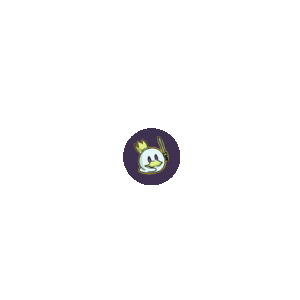
My most effective experience with Goldfishing was in Pauper with the Tron deck. It wasn't the common version that relies on a stronger late game with a control stance. My Tron had Crop Rotation, Expedition Map (which is now banned) and Ancient Stirrings, meaning it was a deck focused on playing the Urza trio on the third turn by at least 60% of matches. Once my Urza lands started generating 7 mana or more, I could cast large threats like Self-assembler or Fangren Marauder, gaining life and preparing to cast Ulamog's Crusher on the fourth or fifth turn.
Ad

It was a low-interaction deck for the first few turns of each game, so I needed to know exactly which hands were most likely to win against the best answers in the metagame at the time.
Exercising my Mulligan for at least 40 minutes a day, this led me to stay for 2 months almost undefeated in the store where I played this deck, until people learned to deal with it and I needed to change strategy.
Goldfishing is not the same efficiency for all decks. Decks with more complex interactions with the opponent can yield fewer results, but even so, I wouldn't do without this practice if you want to gain intimacy with the cards in your deck.
As a result, by knowing better the types of hands and interactions your deck includes, you'll remember them easily, which results in less on your mind when making a decision, meaning more focus! It's almost as simple as 1+1=2!
Lastly, if you have good mental visualization skills, you can try to store more interactions or more complexly imagine your imaginary opponent's number of cards and plays. As I don't have a good ability to visualize images yet, I ended up using this technique more to familiarize myself with the cards in my deck and their possibilities.
3. Knowledge of basic rules
I had promised myself that I wouldn't say something any good Magic player should know. But this tip turned out to be much more necessary than I thought.
In my experience, most store players or non-competitive players don't have clearly in their minds the orders of steps and phases of a Magic turn.
That said, it seems almost obvious that better knowledge of the rules will give you more naturality when deciding the time and what to do in your matches.
A practical example of this is the Spellstutter Sprite card.

Upon entering the battlefield, it triggers an ETB ability that lets you counter a spell with a cost less than or equal to the number of faeries on the battlefield.
The big key on this card is to make sure that when resolving the ability, you will have a number of faeries equal to or greater than the cost of the spell your opponent is casting. Simple, right?!
However, there will be situations where your opponent can respond by using that open red mana with a Lightning Bolt, for example, destroying your Spellstutter before the ability to count the faeries on the field. If so, you may lose the effect.
But if you're considering protecting yourself from a one mana spell the next turn, and you have a Faerie Seer in your hand, there's nothing more useful than ensuring the efficiency of your Spellstutter, casting Faerie Seer first.
It's a kind of silly example, but we can see this kind of advantage being decisive in some matches, simply by understanding how the rules work.
And again, the more you understand the rules and understand how your deck works, and the more you use auto dialogue to emphasize these things, the more you'll be able to focus on the specific rules that benefit your deck.
Ad
4. Breath control
This tip is where we started to get into actions that directly influenced your focus during the match.
Breath control is something that is good not only to do during a game, but also to get into the habit of meditation.
By focusing on the breath and observing it, we train our brain to focus on anything.
But turning to a match, there are times when our thinking can become chaotic and our minds can start to wander. It could be that someone dropped something heavy and made a noise next to you, or someone keeps telling you about the latest episode of Game of Thrones on the next table... Whatever makes you snap out of your concentration, you can settle down just by controlling your breathing and using yourself dialogue to focus back on the match.
In general, taking a deep breath and closing your eyes for a few seconds is effective in cutting out all the noise your mind makes. Exercise this, and over time you'll need fewer seconds to get back into that tense game.
5. Rituals and reminders
Rituals and mental reminders are ways to make the gaming experience less confined to the mind and make play and decisions multisensory.
And what do I mean by multisensory? That's what you're thinking, in multiple senses.
When, for example, we say something out loud, not only are we using the vocal channel, but we are also hearing it using the ear canal.
In Magic: The Gathering, we have some features that we can use besides speech.
Rituals are established whenever you don't want to forget something, like the trigger of an ability or the open mana in the opponent's pass that can be used, for example, for a Think Twice.

Rituals can be anything mechanical; from always arranging the types of permanents in a certain place on the table and in pre-set order, to using dice on top or to the side of your deck to remind you of actions you need to take.
Each player will have their rituals and reminders. Some like to shuffle their hand on their opponent's turn, to remind them that they have cards in their hand and that at any time they can use them to answer any play with them.

A very useful one, used by some players, is to leave a die on top of the deck whenever Delver of Secrets is on the field. This helps to remember the Delver trigger before the draw step where, if the top card happens to be a Sorcery or Instant Spell, it can flip your Delver and turn it into a relevant 3/2 Aberration with flying.
A good ritual is to get into the habit of, in the midst of your reasoning difficulties, reading your cards and your opponent's. This will also help to organize ideas and bring a more active game dynamic.
Rituals are good for giving your hands more movement or using your voice whenever you need to do something in the game, actions that are resources beyond what is “necessary” to simply play cards.
Our brain learns better when we engage more senses and, so to speak, it focuses better when remembering what we have to do is not just in the mental realm.
Ad
6. Disconnect to recharge
Finally, among the practical tips you can apply today in your store, we have disconnection.
The disconnect comes from our brain's need to recharge its motivation system every period of time.
Research within neuroscience claims that the average time a person can stay focused varies between 50 minutes and 1 hour and a half.
After this period, we feel the need to rest, as our brain temporarily loses the ability to focus attention on that particular category of activity.
What do we do when this happens?
That's what you're thinking! Although it seems counter-intuitive, between one match and another, it is necessary not to think about Magic.
"But how so? I've finished a match, so will I have to think about anything other than Magic until the next match?”
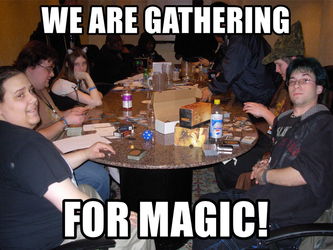
Yes, my friend! When we focus on a single activity for an extended period of time, it is necessary that we focus on another activity of a different nature so that that part used by our brain can rest and recharge our energies to come back super focused again for the next matchup!
In a store, in the middle of a championship, it would be difficult for you to do something like washing the dishes or sweeping the place, these two activities being the best thing to catch your attention after spending long minutes using your head for something logical like a card game which complexity is comparable to chess.
Therefore, talking about anything that is not Magic and that does not generate any kind of stress or force you to reason logically would be a good thing to do.
If you can, ideally close your eyes and relax for 10 or 15 minutes. This relaxation will recharge your energy and motivate your brain to focus fully the next time you require it to decide whether to counter your opponent's Karn or leave mana to cast your Collected Company at the end of turn.
Habits to improve your brain chemistry
If you've read this article so far, I congratulate you, you're already a more focused person than most, and you're really looking to reduce your opponents' life as much as possible to zero.
If you want to go to the next level, we will have to take care of the chemical part and help our brain to have more favorable conditions to generate that unshakable concentration that great champions have.
So, here's a list of 4 habits that will help your brain get more focus and thinking ability in Magic matches.

1. Enjoy the Sunshine
Many people consider themselves to be nocturnal and end up exchanging day for night in search of more comfort or productivity. The big problem with this is that studies indicate that our eyes have receptors that capture sunlight and regulate our sleep cycle. When we change the day for the night, we spend less time awake in contact with the sun's rays, which brings, in the long run, a drastic decrease in our capacity of motivation and focus. The tip is to wake up as early as possible and enjoy the sunlight, stay in a bright environment and sleep as close to the sunset as possible.
Ad
I'm not saying that with this you'll have to wake up when the rooster crows and sleep when the sun goes down. But the earlier you wake up and the less time you spend awake in low light, the less you will need to use alarm clocks to wake up and the more your body's ability to be awake during the day you will have.
2. Eating small amounts of good quality food
This tip is simple, but not so well applied in society. Eating small amounts and foods of good nutritional quality will improve your body's health and, consequently, your brain's health (even because the brain is part of the body, right?).
The tip is to eat well, but not too much.
Eating well is also about choosing lighter foods at night and stronger foods in the morning.
You'll also notice that by eating better quality food, your mood will also improve. The key to good focus is a balanced combination of high mood and moderate stress, just to the point of keeping us on our toes. Good nutrition will help you get there.
3. Physical activities
I don't intend to go into too much of this topic.
Physical activities are paramount, but what everyone complains about is that they are painful and cost time in our day.
The tip is to use the time when you need to sunbathe early in the day to go for a light walk or ride a bike. Anything much longer than 20 minutes a day will be enough to greatly improve your living quality.
Over time, you will notice that your mental clarity and focus will improve and, if you want, you can even increase this time to seek even more quality in your life.
Physical activity is an important part of the focus, when we move our body we reduce pain and discomfort that may arise with sedentary lifestyle, and all these symptoms take the focus and consequently reduce your ability to make decisions.
4. Sleep well
To be blunt, sleeping less than 7 hours a night is not healthy for anyone. Of course, I consider that there are people who work too hard and end up feeling the need to sleep less to have more time to do their daily activities.
This is not effective, as when you get less sleep than necessary, your irritability and intolerance to boring activities increases. Neurological studies indicate that when sleeping 6 hours a night for a week, patients had an income similar to people who just spent a whole night without sleep.
In other words, little sleep affects all your cognitions, especially the prefrontal cortex, the area of the brain responsible for our logical decisions.
So, the tip is to sleep at least 7 hours a night, if possible adjusting the time so that, when you wake up, you have a natural awakening, without alarms.
Some studies also indicate that a mid-afternoon nap can help you recharge your focus energies.
In general terms, I would advise it to be a 20/25 minute nap, as this will get you into a sleep phase that will already help you to wake up in the mood and will have recharged all your focus energies without compromising your night's sleep.
There is also 90 minutes sleep that can be applied so that a very deep recovery helps you to regain focus as if you just woke up in the morning.
Ad
The great danger is that this last one and a half hour nap cannot be taken after 3PM because when applied after that period, it can compromise the night's sleep, which is the most important.
Conclusion
Summarizing well what we've learned here today, we get the feeling that working with focus is not only a great resource to live our lives at most, it also helps us to have better results in everything we do.
In the card games world, it's no different, professional players are all the time looking for complex and unusual solutions to keep their opponents short, and to reach this level of dynamic understanding of the game, they all needed to train their focus in some way.
Practices from the first part of the text will help you to create more familiarity in the game and better understand that your plays are not just tap mana and cards around the table in no order.
The main habit a focused person creates is the habit of reasoning logically and making good decisions.
And to make this more possible, the second part of the text has brought you habits that will improve your brain chemistry.
An important warning, which cannot be overlooked, is that if you happen to have severe problems with your attention and these difficulties affect many areas of your life, you may need to see a specialist to seek an accurate diagnosis that helps you.
A last tip would be that you write down all the situations you have difficulty making decisions and create practical solutions using the tips in this text to solve them.
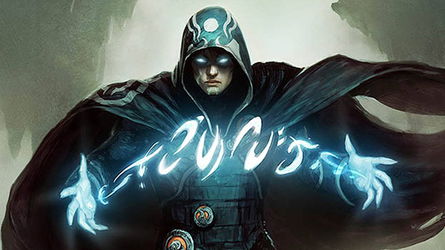
Finally, if you enjoyed this article and somehow benefited from it, be sure to share it with your friends. The next time a friend of yours takes a few seconds before countering that Liliana of the Veil, it's not because he's indecisive or doesn't know how to play, he must really be thinking about the options at hand. So, if you are focused on noticing these behaviors, you can plan your next move taking into account the readings you make of the game and will always be one step ahead of your opponents.
See you next time, good games!
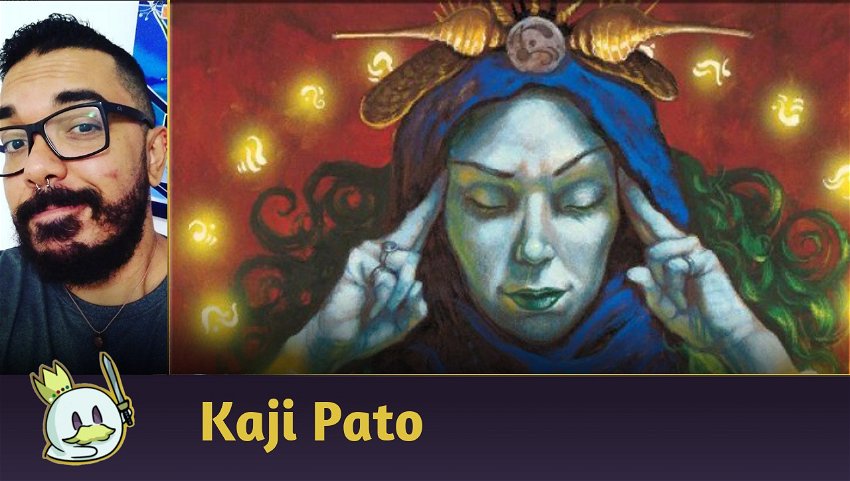




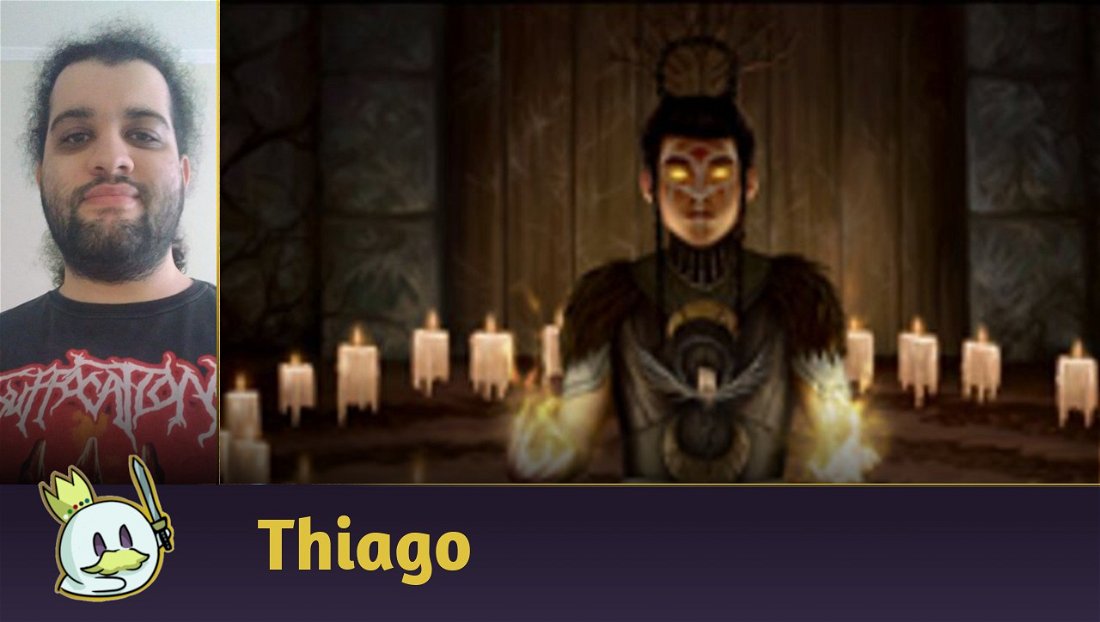

— Comentarios0
Se el primero en comentar